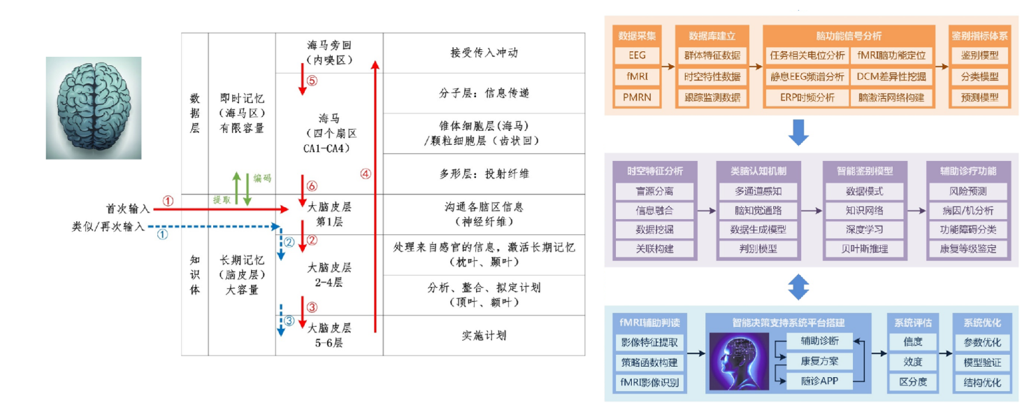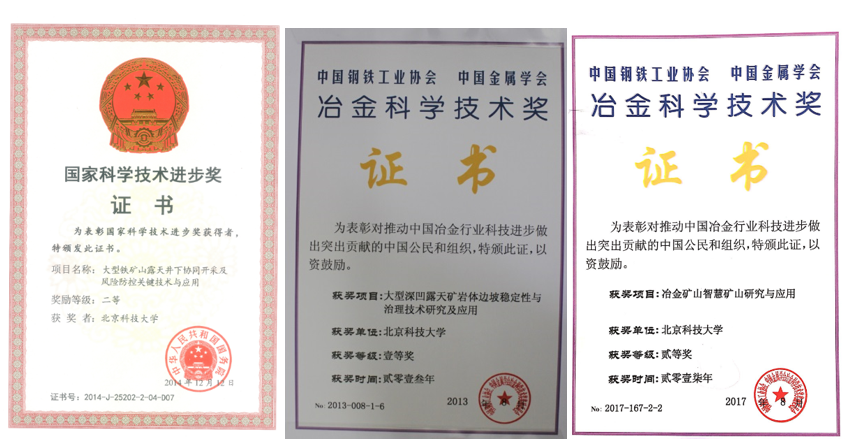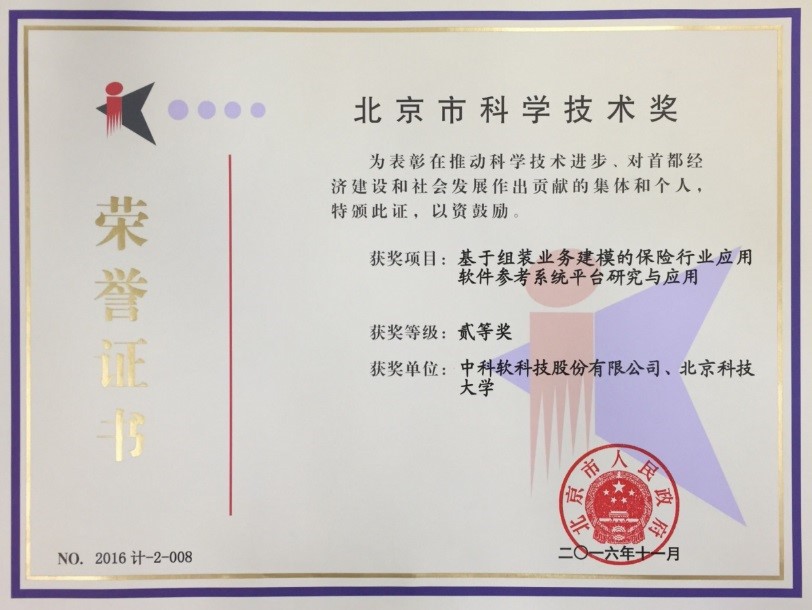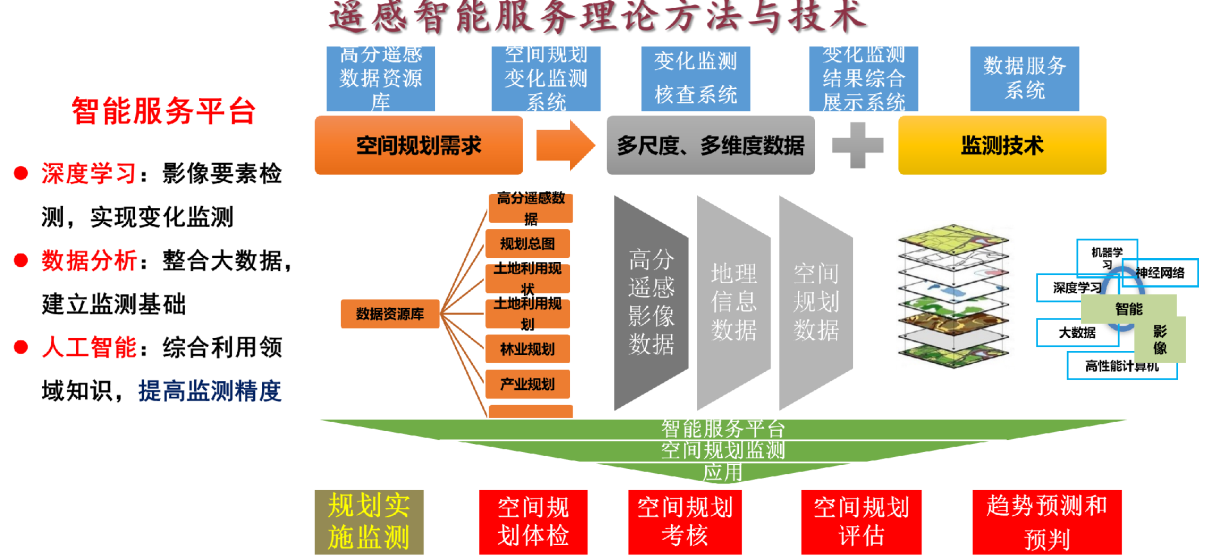【Team Name】
Knowledge Engineering (Brain Intelligence) Lab
【Team direction】
Ø Natural language processing, satellite image processing
Ø Big data, deep learning, brain-like intelligence
【Team Profile】
1. Scientific research
He has been focusing on the research of brain-like cognitive mechanism and intelligence theory for a long time, carrying out technical research on natural language processing, satellite image processing, knowledge map, large-scale knowledge engineering, and the design method and implementation technology of brain-like intelligent system. Integrating big data, deep learning and other technologies, completed the research and development of the brain-assisted diagnosis system of Chinese medicine, and completed the development of brain-like intelligent remote sensing image processing and application system. Carried out research on industrial manufacturing big data and intelligent control technology for intelligent manufacturing.
The team has undertaken more than 50 scientific research projects, including more than 10 national-level research and development projects, national science and technology support and other national-level projects, 32 patent applications, 34 software copyrights, more than 40 academic papers published, and 3 books published. Scientific research achievements won 1 second prize of National Science and Technology Progress Award, 1 first prize of metallurgical science and technology award, 1 special prize of metallurgical mine science and technology, 1 second prize of metallurgical science and technology, and 1 second prize of Beijing science and technology , 1 third prize of Beijing Science and Technology Award, 1 third prize of Liaoning Science and Technology Progress Award, 1 second prize of Ministry of Education's technological invention project. The teaching achievements of the team won the first prize and second prize of Beijing Higher Education Teaching Achievements.
2. International Cooperation
German Artificial Intelligence Research Center (DFKI): Research covers the direction of artificial intelligence industries such as big data analysis, knowledge management, understanding and natural language processing, human-computer interaction, and robotics.
Surgical simulation research experiment at the University of Alberta, Canada: Based on human factors engineering research artificial intelligence technology, human factors engineering is introduced into surgical skill training and surgical new technology innovation fields.
Dietrich School of Humanities and Social Sciences, Carnegie Mellon University, USA: Cognitive neuroscience, modern linguistics, and interdisciplinary research scientists; based on human behavior and neuroscience research, dedicated to artificial intelligence and cognitive science And innovative research work on neural networks.
3. Student training
The knowledge engineering laboratory team has rich scientific research resources, a perfect experimental environment, a flexible management system, and a systematic training system for the personalized development of graduate students.

4. Academic activities
The laboratory is active in the frontier fields of information technology such as big data and artificial intelligence. It has rich academic activities and encourages graduate students to participate in various academic exchange activities, such as academic lectures and corporate competitions.

5. Where to graduate
In the era of big data and artificial intelligence, there is an urgent need for new data-related positions such as data scientists and data analysts. The government and enterprises recognize the students trained in the laboratory. The students who graduated from the laboratory are welcomed by major companies:
Baidu, Microsoft, Sina, Oracle, Sohu, Sogou, Qunar, Youku, Alibaba Research Institute, ICBC Head Office / Branch, UnionPay Beijing Information Center, Digital China, Lenovo Research Institute, Unicom Research Institute, Ministry of Commerce, Drug Administration Bureau etc.
【team member】
Zhang Dezheng, male, professor / doctor
Director of Beijing Key Laboratory of Knowledge Engineering in the field of materials. His research direction is big data and artificial intelligence. Currently, he is focusing on the research of brain-like intelligence technology. The research results are applied in the fields of intelligent assistant diagnosis of traditional Chinese medicine, intelligent processing of satellite remote sensing data, and industrial intelligent control. He has undertaken more than 30 vertical projects at the national, provincial and ministerial levels, and is responsible for more than 40 cooperative projects of the factory association.
Academic part-time member of national artificial intelligence standardization expert consulting group, artificial intelligence consulting expert of National Development and Reform Commission, intelligent manufacturing solution expert of Ministry of Industry and Information Technology.
Won the 4th "Researcher and Friends" of University of Science and Technology Beijing. Lecture courses on computer system security (this), data mining (research), advanced artificial intelligence (research)
Aziguli, female, professor
Deputy director of Beijing Key Laboratory of Knowledge Engineering in the field of materials, research direction knowledge engineering, knowledge map, artificial intelligence, undertaking the construction of conditional platforms for the Ministry of Science and Technology and Beijing Science and Technology Commission, participating in the top-level design of multiple smart cities, and responsible for national 863 and national key research More than 30 projects such as the plan and Beijing provincial and ministerial level projects, responsible for and participating in many cooperative projects of the factory association, as an expert of the Ministry of Science and Technology, Beijing Science and Technology Commission, teaching the principles of computer composition of the course (this), software architecture (research), software Modeling technology (research).
Xie Yonghong, female, associate professor
Research direction Knowledge engineering, natural language processing, participate in many national major research projects, national natural fund projects, have a wealth of theoretical basis and practical experience in big data analysis technology, knowledge engineering and knowledge discovery research, lecture discrete mathematics (this ), Knowledge engineering topics (research), advanced artificial intelligence (research).
Taotao Zhang, female, associate professor
Research direction Knowledge engineering and knowledge discovery, computer modeling and simulation, presided over overseas study abroad fund projects, participated in many national projects and other scientific research projects, published dozens of scientific papers, including 1 SCI paper in the first area, 2 papers in the second area , Lecture course programming language (this), university computer basics (bilingual) (this).
Liu Honglan, female, associate professor
Research direction Multi-valued logic research and application, machine translation, knowledge engineering and Chinese text information processing. As the main participant, he has participated in 3 projects of the National Natural Science Foundation of China and 3 horizontal topics in the past 5 years, and published the paper as the first author 11 articles. Lectures on computer composition principles (this), discrete mathematics (this).
Zhi Ruicong, female, associate professor
His research interests include artificial intelligence, computer vision, pattern recognition, sentiment analysis, and signal processing. In the past five years, he has undertaken or participated as a backbone in the research work of more than ten topics at the national, provincial and ministerial level, and the association of factory associations. Lecture courses: University Computer Basics (this), C ++ programming (this), programming and object-oriented methods (this).
Guo Qian, female, lecturer, youth reserve force
The research direction is spatial database, large-scale data processing, data privacy protection, query processing of spatially uncertain data. He has long been engaged in the research of database theory, focusing on decision support query theory and key technologies, and has achieved innovative research results in the direction-based surrounding nearest neighbor query technology and combined contour query technology. Lecture course design foundation A (this), IoT security.
Liu Xin, female, lecturer, youth reserve force
Research direction: Intelligent information processing and data mining. Focus on researching intelligent computing theory and methods, multimodal information fusion in the intersection of medicine and information science, data generation and expansion, uncertainty reasoning and decision-making technology. Lecture courses Microcomputer principles and applications (this), intelligent robot control (this).
Ren Jiping, female, engineer, key laboratory management
The full-time laboratory management teacher is mainly responsible for the daily management of the team operation, project assistants, etc., cooperates with the instructor in formulating the laboratory management system, student training plan, and is responsible for the team's scientific research project declaration, research achievement management, and equipment management.
【Outstanding results】
1. Brain-like computing model with embodied cognitive mechanism and mirror neurons
Establish an embodied cognitive theory system, brain functional structure modeling, brain-like cognitive intelligence model, and build a shared platform for brain cognitive and intelligent data analysis.

2. Construction and service of famous and traditional Chinese medicine national service platform
Natural language processing, knowledge map of traditional Chinese medicine, large-scale knowledge base of traditional Chinese medicine, intelligent brain-assisted diagnosis of traditional Chinese medicine, and other technologies, the establishment of a well-known traditional Chinese medicine inheritance national service platform, Beijing Guoyi.com and other service platforms in the field of traditional Chinese medicine, resulting in huge social benefits.

3. Achievements in smart manufacturing fields such as smart mines
Deep learning image analysis, deep learning reinforcement learning, swarm intelligence, industrial big data, big data risk monitoring and early warning, industrial intelligent management and control, smart security, smart management and control, smart mining and other technologies; related technologies won the second prize of National Science and Technology Progress Award (2014 ), The first prize of metallurgical science and technology progress (2013), the second prize of metallurgical science and technology progress (2017); produce huge economic benefits.

4. Large-scale knowledge graph and modeling technology achievements
Business modeling technology, knowledge graph, natural language processing, software automation technology.

3. Remote sensing intelligent service platform for natural resources, ecological environment and environment
Deep learning remote sensing image interpretation and change detection technology, remote sensing big data, geospatial big data, geographic knowledge map, geospatial embedding, spatial brain intelligence technology, spatial planning intelligent monitoring and evaluation and other technologies, remote sensing intelligent service platform construction


【Contact person and contact information】
Laboratory office location: 1222, Electromechanical Information Building;
Laboratory contact number: 010-62334547;
Lab contact teacher:
Zhang Dezheng, zdzchina@126.com;
Ren Jiping, renjiping@ustb.edu.cn.



